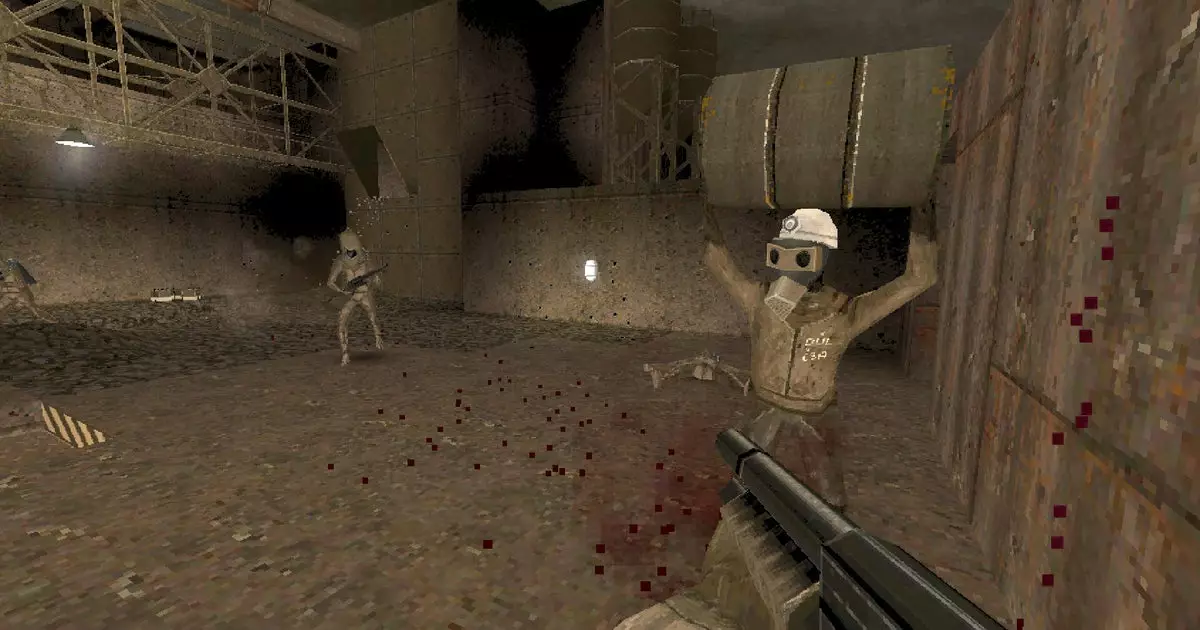In the realm of indie gaming, few titles manage to capture players’ imaginations like Hrot. This Quake-inspired shooter transports players into a surreal, retro-futuristic rendition of Prague, complete with satire, horror, and a healthy dose of the bizarre. Yet, despite the atmospheric charm and engaging gameplay, a peculiar technical flaw threatened to overshadow its accomplishments. The issue at hand? Dogs that just wouldn’t stop barking.
While most developers would quietly fix technical glitches behind closed doors, Spytihněv, the game’s creator, took a different route. He addressed the vocal canine complaints head-on, acknowledging their incessant barking that turned into an absurd, unending cacophony for many players. “A lot of people have complained about some barking,” he remarked in a recent update, a candid admission that highlights both the playful and serious undertones of the development process. While paradoxically humorous, the situation epitomizes the fine line game developers walk on—balancing the quirks of realism with entertaining gameplay mechanics.
The dog in question was meant to serve as a throwback to classic gaming tropes, reminiscent of those beloved yet easily forgotten NPCs that add life and levity to dark atmospheres. However, a bug affected the sound mechanics, leading to a looping sound that wreaked havoc on the player experience. On some systems, particularly Linux-based platforms, players found themselves tormented by this glitch for over two years.
Developers are often the unsung heroes in the games industry, tirelessly refining their creations, sometimes at the expense of their own sanity. But even the best can succumb to the complexities of coding. Spytihněv’s honesty regarding this frustration is refreshing in an industry that often strives for perfection. By admitting the error, he not only placed the blame squarely on the technical aspect but also showcased his commitment to improving the game. The game had even become “downright unplayable” at specific levels, a realization that seemed to weigh heavily on the developer’s shoulders.
The Artistic Vision of Hrot
While the barking dogs may have briefly dominated conversations around Hrot, the true fabric of the game lies in its artistic ambitions. Drawing players into a narrative steeped in rich allegory, Hrot employs its peculiar imagery to question societal norms and historical fears. One gameplay instance even includes kissing the portrait of Klement Gottwald, Czechoslovakia’s first communist leader—a bizarre yet thought-provoking mechanic that transmits the theme of loyalty. Players are asked to navigate responses to iron-fisted governance while mingling with macabre settings, from claustrophobic underground chambers to vibrant cityscapes filled with playful satirical references.
Though Rick, a reviewer for the game, found the oddities of Hrot to overshadow the charming dog aspect, he did provide an insight into the narrative’s brilliance. Set in a quasi-historical backdrop, Hrot is laden with references, from shooting gas-masked horses to confronting surreal doppelgangers of modern political figures. However, there lies a subtle irony that complements the horror and violence—a reminder of past anxieties wrapped in a modern package, enriching the player experience and keeping engagement at the forefront.
Following the foray into the peculiar world of Hrot, Spytihněv shifted his focus to a different genre altogether—strategy. His next project, Shrot, echoes the whimsical essence of his previous work but treads into new territory with a retro RTS theme. Set on a “sandy planet,” this game promises to blend technology and nature, tantalizing the senses with horses, tractors, and techno music—a bizarre concoction that could only emerge from a mind willing to embrace unpredictability.
The stylistic pivot might seem unexpected, but it showcases a developer’s versatility in crafting unique gaming experiences. Just as Hrot challenged traditional gaming narratives through its peculiar combination of humor, horror, and history, Shrot appears primed to take that creative spirit into unexplored realms, ensuring that players are continually surprised and engaged.
The journey of Hrot and its developer encapsulates the essence of indie gaming—full of humanity, unpredictability, and ultimately, a blend of both technical glitches and artistic triumphs. It serves as a reminder that even in the face of barking dogs and bizarre gameplay, creativity and dedication shine through.


Leave a Reply